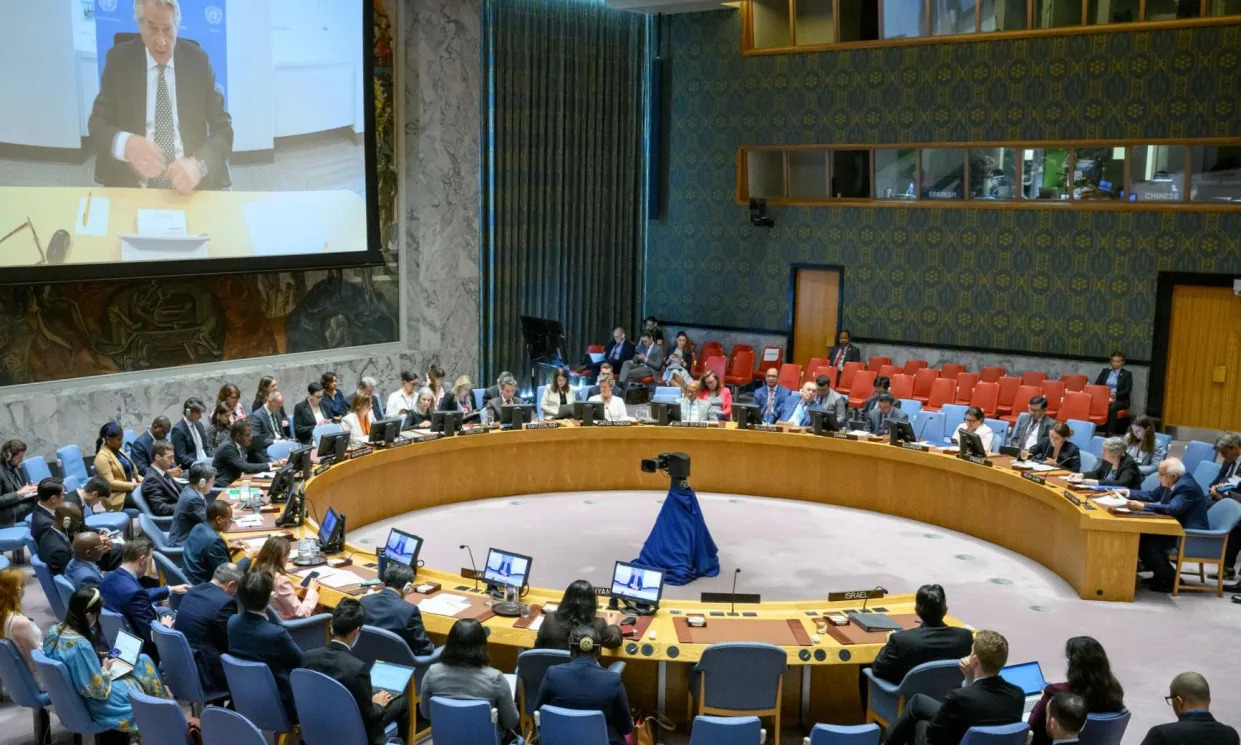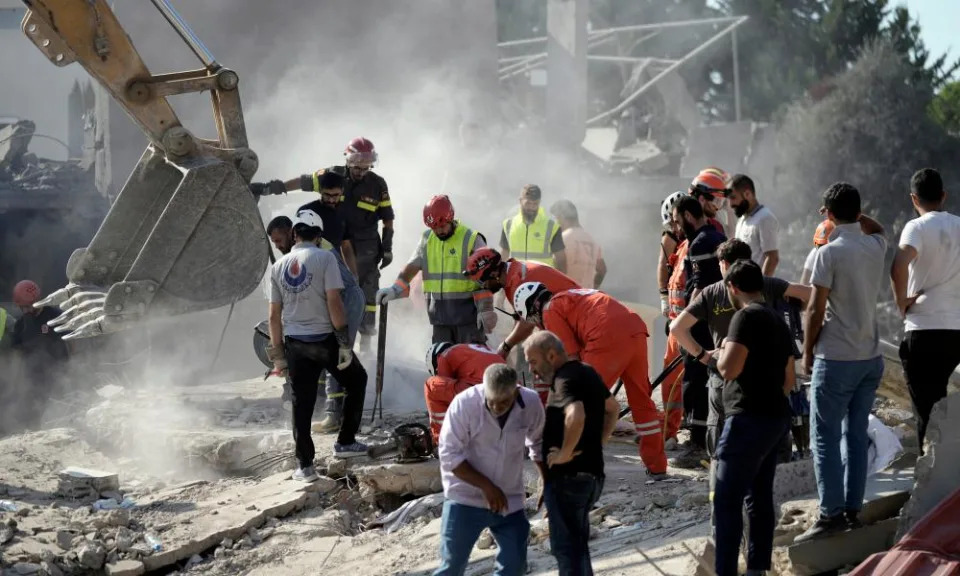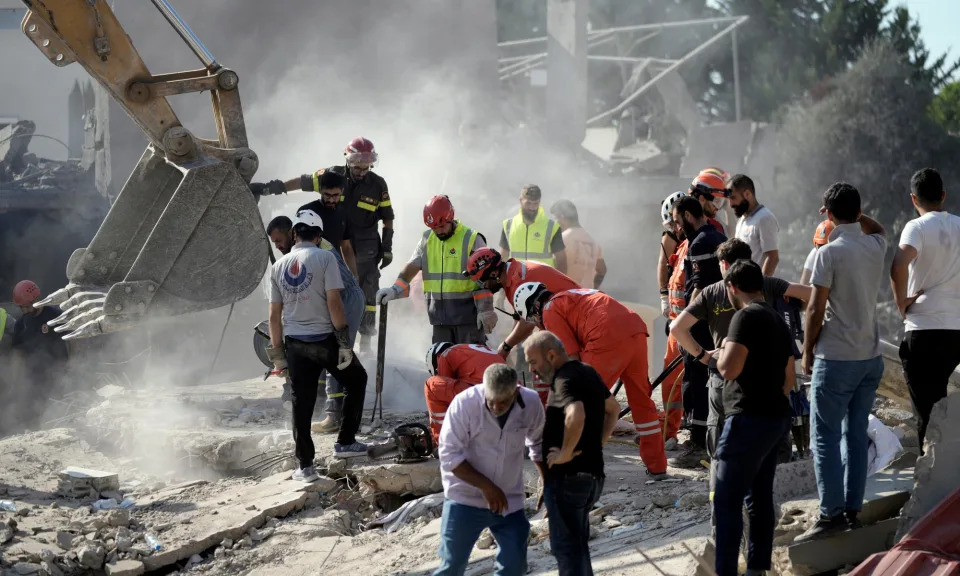Patrick Wintour in New York
Wed 25 September 2024

A UN security council briefing on the crisis in the Middle East.Photograph: Xinhua/Rex/Shutterstock
An effort led by France and Britain to secure a joint statement by the UN security council calling for a ceasefire in Lebanon has stalled in the face of US objections.
Washington is eager to avoid any suggestion there is any equivalence of blame for the eruption of the crisis that has led to the loss of life of hundreds of people in Lebanon.
Antony Blinken, the US secretary of state, has been firm in asserting Israel has a legitimate problem to solve, blaming Hezbollah’s continued rocket fire into Israel ever since the Hamas attack on Israel on 7 October.
At one point there had been suggestions the UN security council, due to start late Wednesday, would be deferred overnight to secure agreement on a joint statement, but diplomats said such hopes were fast fading.
The differences emerged at a G7 dinner on Tuesday night. Both Emmanuel Macron, the French president, and David Lammy, the UK foreign secretary, went public in calls for a ceasefire to end the fighting. France and UK had also called for a ceasefire in meetings with allies in Paris a week ago.
European sources said the US had been working on a different, more complex, formula, and was sensitive to Israeli pressure or wording that would be seen to block its military offensive to degrade Hezbollah.
In a round of morning TV interviews Blinken was careful not to call for a ceasefire in Lebanon, referring instead to a diplomatic agreement.
He told ABC News that Hezbollah had started firing rockets into Israel after the deadly attacks of 7 October, saying: “People who lived in northern Israel had to flee their homes – homes were destroyed; villages were destroyed – about 70,000 Israelis. Israel started responding. You have Lebanese in southern Lebanon who’ve also had to flee their homes. We want to see people get back to their homes. The best way to do that is through a diplomatic agreement – [one that] pulls the forces back, creates space and security so that people can get back to their homes, kids can get back to school.”
Joe Biden also told ABC television that all-out war was possible, but added: “We’re still in play to have a settlement that can fundamentally change the whole region.”
In his address to the general assembly, Macron was more forthright, saying:
“There cannot be, must not be war in Lebanon.”
At a meeting with the Qatari prime minister, Mohammed bin Abdulrahman Al Thani, Blinken only referred to seeking a ceasefire in Gaza – the precondition Hezbolllah set for ending its relatively low-level but hugely disruptive assault on Israel.
Blinken also repeated his claim that it was Hamas and not Israel that was holding up a ceasefire agreement in Gaza.
Saying that 15 of the 18 paragraphs in the ceasefire agreement were signed off, he said: “The problem we have right now is that Hamas hasn’t been engaging on it for the last couple of weeks, and its leader has been talking about an endless war of attrition. Now, if he really cares about the Palestinian people, he’d bring this agreement over the finish line.
“Hard decisions remain to be made by Israel. But the problem right now in terms of bringing this across the finish line is Hamas, its refusal to engage in a meaningful way,” he added.
In contrast, the foreign ministers of Egypt, Jordan and Iraq said in a joint statement: “Israel is pushing the region towards total war.”
The Lebanese foreign minister, Abdallah Bou Habib, said the US approach was “not promising”, adding: “It will not solve the Lebanese problem. The US is the only country that can really make a difference in the Middle East with regard to Lebanon.”
France and US push for 21-day Hezbollah-Israel ceasefire in Lebanon as UN chief warns ‘hell is breaking loose’
Patrick Wintour and Andrew Roth in New York
Wed 25 September 2024


France pushes for 21-day Hezbollah-Israel ceasefire in Lebanon as UN chief warns ‘hell is breaking loose’
The US and France have called for a 21-day temporary ceasefire between Israel and Hezbollah to make way for broader negotiations, as the UN secretary general, António Guterres, told a UN security council meeting that “hell is breaking loose” in Lebanon.
Israel’s top general has said the country is preparing for a possible ground operation into Lebanon after an intense three-day bombing campaign that has killed more than 600 people, further fuelling fears of a regional conflict.
The joint statement issued by US president Joe Biden and French counterpart Emmanuel Macron said: “It is time for a settlement on the Israel-Lebanon border that ensures safety and security to enable civilians to return to their homes. The exchange of fire since October 7th, and in particular over the past two weeks, threatens a much broader conflict, and harm to civilians.”
The two leaders, who met on the sidelines of the UN general assembly in New York, said they had worked on a temporary ceasefire “to give diplomacy a chance to succeed and avoid further escalations across the border”.
They urged Israel and Lebanon to back the move, which was also endorsed by Australia, Canada, the European Union, Germany, Italy, Japan, Saudi Arabia, the United Arab Emirates and Qatar.
A senior US administration official said on Wednesday night that both Israel and Lebanon, which was understood to be representing Hezbollah in the negotiations, were expected to respond to the call “in the coming hours.”
Officials in a background briefing also emphasised that the ceasefire proposal does not apply to the conflict between Israel and Hamas in Gaza.
The US said that the 21-day period was chosen in order to provide space in order to negotiate a more comprehensive agreement between the two sides to allow residents to return to their homes along the Israel-Lebanon border without fear of further violence or an “October 7th-like attack in the future.”
The announcement came at the conclusion of a heated UN security council meeting, which saw Lebanon’s prime minister accuse Israel of violating his country’s sovereignty. Najib Mikati said Lebanese hospitals were overwhelmed and unable to accept any more victims.
Israel’s UN envoy told the security council said that his country did not seek a full-scale war and that Iran was the “driving force” behind the instability sweeping the Middle East.
For his part, Iranian foreign minister Abbas Araqchi said the US and UK’s “unwavering support for Israel has given them carte blanche for all sorts of sinister behaviour”.
Related: Can Israel avoid same pitfalls of past ground offensive in Lebanon?
There have been tensions between the US and its European allies about whether to call for an immediate ceasefire at the security council. The UK foreign secretary David Lammy backed an immediate ceasefire, saying it was time to pull back from the brink, adding “a full blown war is not in the interests of Israeli or Lebanese people”.
He said nothing justified Hezbollah’s attacks and urged Iran to use its influence to persuade Hezbollah to agree to a ceasefire.
But US diplomats indicated an unconditional ceasefire call in the form of a joint security council statement could be seen as accepting a moral equivalence between the behaviour of Israel and Hezbollah, a group that is labelled a terrorist group by the US.
The proposal for a temporary three-week cessation of hostilities might provide a platform to reopen stalled talks on the discussions over a ceasefire between Hamas and Israel in Gaza. Hezbollah has said it will stop its strikes if Hamas agrees to a Gaza ceasefire, but there is no sign currently of either the Hamas leadership or the Israeli prime minister Benjamin Netanyahu coming to an agreement.
Netanyahu was due to arrive in New York on Thursday, and is expected to set out whether he supports a 21-day break in hostilities.
The US deputy envoy Robert Wood said “diplomacy will only become more difficult” if the conflict escalates further, adding he was gravely concerned by reports that hundreds of Lebanese civilians had died in recent days.
But he insisted the origin of the conflict was the hundreds of thousands of Lebanese civilians, and 65,000 Israeli civilians, who have been displaced due to Hezbollah’s decision on 8 October to break the peace that has largely endured.
He said that no one wanted to see a repeat of the war in 2006, adding “the war must end with a comprehensive undertaking that has real implementation mechanisms”.
No details of the implementation mechanisms were set out by the US envoy, but it is not likely to be backed by Hezbollah if it infringes on its sovereignty.
Terms/Privacy Policy
Privacy dashboard
About our ads
No comments:
Post a Comment